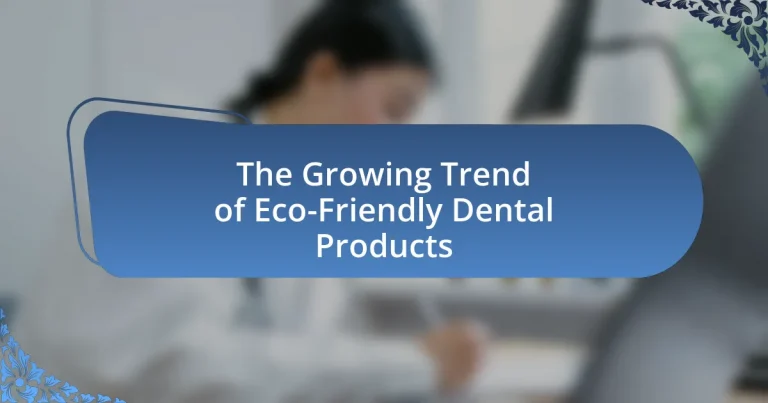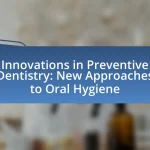Eco-friendly dental products are oral care items designed to reduce environmental impact through sustainable materials and practices. This article explores the differences between eco-friendly and traditional dental products, highlighting the use of biodegradable materials like bamboo and natural ingredients in toothpaste. It discusses the growing consumer interest in sustainable alternatives, driven by increased awareness of environmental issues and the desire for healthier options. Additionally, the article outlines the benefits of using eco-friendly dental products, including reduced plastic waste and improved personal health, while providing guidance on how consumers can transition to these sustainable choices effectively.
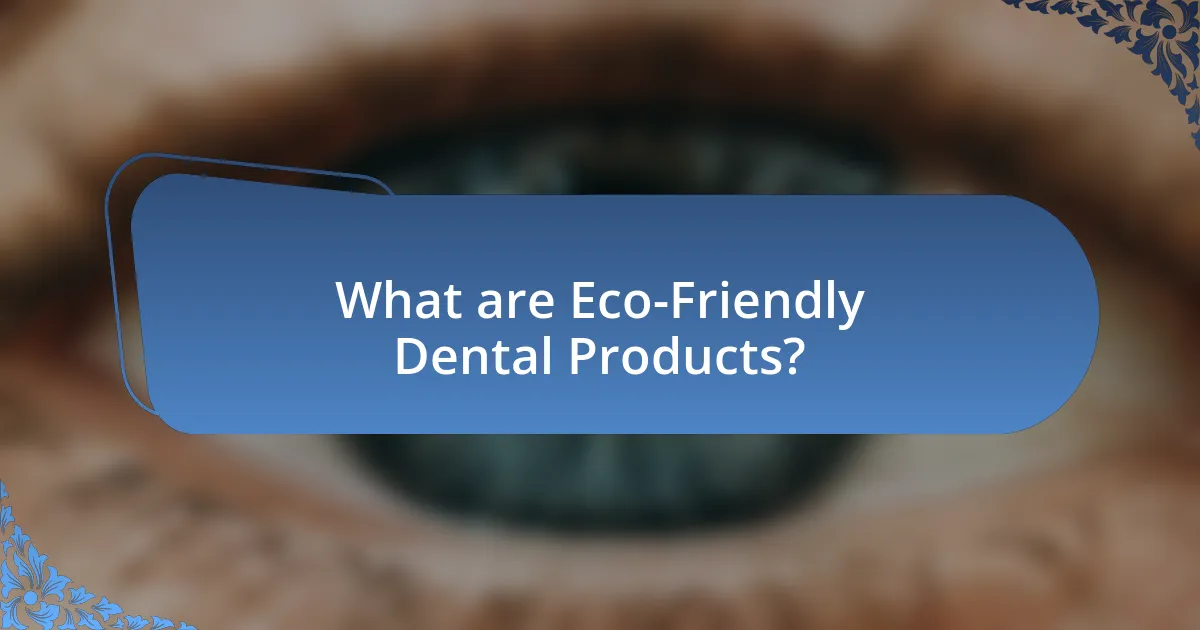
What are Eco-Friendly Dental Products?
Eco-friendly dental products are oral care items designed to minimize environmental impact through sustainable materials and practices. These products often include biodegradable toothbrushes made from bamboo, natural toothpaste free from harmful chemicals, and floss made from organic materials. The use of such products helps reduce plastic waste and promotes a healthier ecosystem, aligning with the increasing consumer demand for sustainable alternatives in personal care.
How do Eco-Friendly Dental Products differ from traditional dental products?
Eco-friendly dental products differ from traditional dental products primarily in their ingredients and packaging. Eco-friendly options utilize natural, biodegradable, and non-toxic materials, such as plant-based ingredients and recyclable or compostable packaging, which reduce environmental impact. In contrast, traditional dental products often contain synthetic chemicals, plastics, and non-biodegradable materials, contributing to pollution and waste. For example, many conventional toothpaste brands include microbeads and artificial preservatives, while eco-friendly brands focus on sustainable sourcing and minimal environmental footprint. This distinction highlights the growing trend towards sustainability in personal care, as consumers increasingly prioritize products that align with environmental values.
What materials are commonly used in Eco-Friendly Dental Products?
Eco-friendly dental products commonly utilize materials such as bamboo, biodegradable plastics, and natural fibers. Bamboo is favored for toothbrush handles due to its rapid growth and renewability, while biodegradable plastics are used in items like floss and toothpaste tubes to reduce environmental impact. Natural fibers, such as those from hemp or cotton, are often incorporated into dental floss and toothbrush bristles, providing a sustainable alternative to synthetic materials. These materials collectively contribute to reducing plastic waste and promoting sustainability in dental care.
How do these materials impact the environment?
Eco-friendly dental products, such as biodegradable toothbrushes and natural toothpaste, positively impact the environment by reducing plastic waste and minimizing chemical pollution. Traditional dental products often contribute to significant plastic pollution, with billions of plastic toothbrushes discarded annually, leading to long-lasting environmental harm. In contrast, biodegradable materials break down more easily, decreasing landfill contributions and promoting sustainability. Additionally, natural toothpaste formulations typically avoid harmful chemicals, reducing waterway contamination and protecting aquatic ecosystems. Studies indicate that switching to eco-friendly dental products can significantly lower an individual’s carbon footprint, supporting broader environmental conservation efforts.
Why is there a growing interest in Eco-Friendly Dental Products?
There is a growing interest in eco-friendly dental products due to increasing consumer awareness of environmental issues and the desire for sustainable alternatives. Research indicates that 73% of consumers are willing to change their consumption habits to reduce environmental impact, highlighting a shift towards products that minimize plastic waste and use natural ingredients. Additionally, the rise of social media and environmental advocacy has amplified the visibility of eco-friendly options, encouraging brands to innovate and cater to this demand.
What consumer trends are driving this interest?
The consumer trend driving interest in eco-friendly dental products is the increasing demand for sustainable and environmentally responsible products. This trend is fueled by heightened awareness of environmental issues, with 66% of global consumers willing to pay more for sustainable brands, according to a Nielsen report. Additionally, consumers are increasingly seeking products that align with their values, leading to a preference for biodegradable materials and cruelty-free practices in dental care. This shift is evident as brands that prioritize sustainability are experiencing significant growth, reflecting a broader movement towards eco-conscious consumerism.
How does awareness of environmental issues influence purchasing decisions?
Awareness of environmental issues significantly influences purchasing decisions by prompting consumers to prefer eco-friendly products over traditional options. Research indicates that 66% of global consumers are willing to pay more for sustainable brands, reflecting a shift towards environmentally conscious purchasing behavior. This trend is particularly evident in the dental products sector, where consumers increasingly seek biodegradable toothbrushes and natural toothpaste, driven by concerns about plastic waste and chemical ingredients. The rise of eco-friendly dental products illustrates how heightened awareness of environmental issues directly impacts consumer choices, leading to a preference for brands that prioritize sustainability.
What are the benefits of using Eco-Friendly Dental Products?
Eco-friendly dental products offer several benefits, including reduced environmental impact, improved health outcomes, and sustainable sourcing. These products are typically made from biodegradable materials, which help decrease plastic waste in landfills and oceans. For instance, bamboo toothbrushes decompose naturally, unlike traditional plastic toothbrushes that can take hundreds of years to break down. Additionally, eco-friendly dental products often contain fewer harmful chemicals, promoting better oral health and reducing the risk of adverse reactions. Research indicates that consumers increasingly prefer sustainable options, with a 2021 survey showing that 73% of respondents are willing to pay more for eco-friendly products. This trend reflects a growing awareness of environmental issues and personal health, making eco-friendly dental products a beneficial choice for both individuals and the planet.
How do Eco-Friendly Dental Products contribute to personal health?
Eco-friendly dental products contribute to personal health by reducing exposure to harmful chemicals and promoting sustainable oral care practices. These products often contain natural ingredients, such as plant-based extracts and essential oils, which can be less abrasive and irritating compared to synthetic alternatives. For instance, studies have shown that fluoride-free toothpaste options, which are often found in eco-friendly brands, can effectively maintain oral health without the potential risks associated with excessive fluoride exposure. Additionally, eco-friendly dental products typically use biodegradable packaging, which minimizes environmental impact and encourages a healthier ecosystem, indirectly benefiting personal health by promoting a cleaner environment.
What environmental benefits do these products provide?
Eco-friendly dental products provide significant environmental benefits by reducing plastic waste and minimizing harmful chemical usage. These products often utilize biodegradable materials, such as bamboo toothbrushes, which decompose naturally, unlike traditional plastic toothbrushes that can take hundreds of years to break down. Additionally, many eco-friendly dental products are free from toxic substances like microbeads and certain chemicals found in conventional toothpaste, which can pollute waterways and harm aquatic life. For instance, a study published in the journal “Environmental Science & Technology” highlights that switching to biodegradable dental products can significantly decrease the volume of plastic entering landfills and oceans, thereby contributing to a healthier ecosystem.
How can consumers identify genuine Eco-Friendly Dental Products?
Consumers can identify genuine eco-friendly dental products by looking for certifications such as the USDA Organic seal or the EcoCert label, which indicate adherence to environmental standards. Additionally, examining ingredient lists for natural, biodegradable components and avoiding products with harmful chemicals like parabens or sulfates can help ensure authenticity. Research shows that products labeled as eco-friendly often contain sustainable materials, such as bamboo or recycled plastics, which further supports their environmental claims. Furthermore, transparency in sourcing and manufacturing practices, often detailed on product packaging or company websites, can provide additional assurance of a product’s eco-friendliness.
What certifications should consumers look for?
Consumers should look for certifications such as the USDA Organic seal, which indicates that products meet strict organic farming standards, and the EcoLogo certification, which signifies that a product has been evaluated for its environmental impact. Additionally, the Certified B Corporation designation shows that a company meets high standards of social and environmental performance, accountability, and transparency. These certifications provide assurance that the dental products are not only eco-friendly but also produced sustainably and ethically.
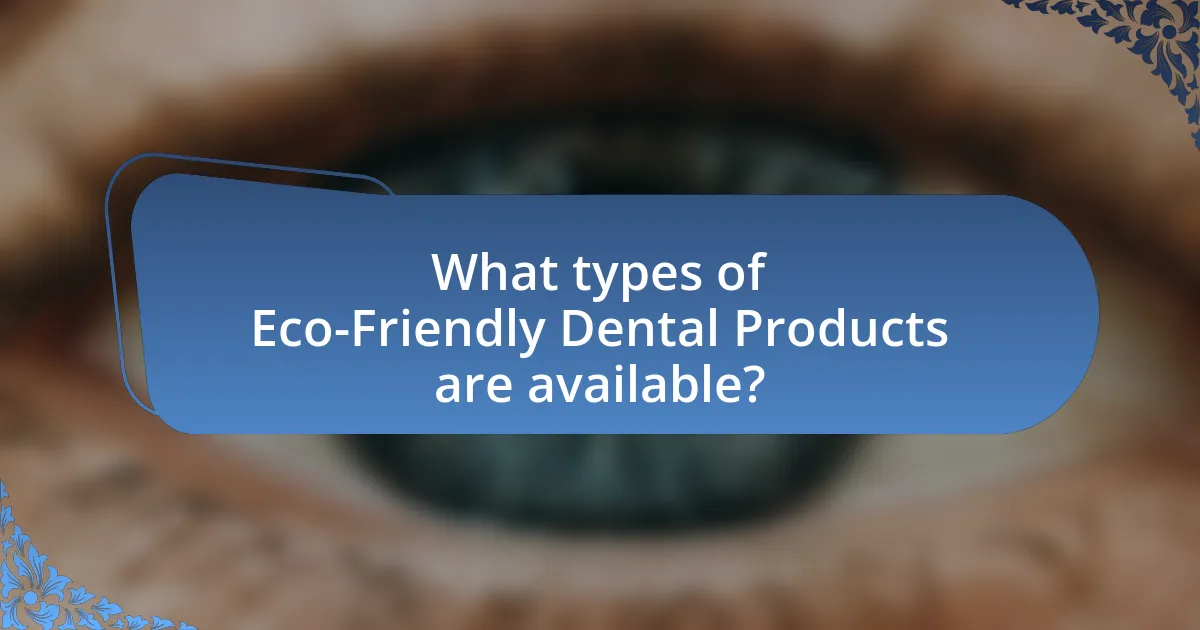
What types of Eco-Friendly Dental Products are available?
Eco-friendly dental products include bamboo toothbrushes, biodegradable dental floss, natural toothpaste, and mouthwash tablets. Bamboo toothbrushes are made from sustainable materials and reduce plastic waste, while biodegradable dental floss often uses silk or plant-based materials that decompose. Natural toothpaste typically contains organic ingredients without harmful chemicals, and mouthwash tablets eliminate the need for plastic bottles, offering a zero-waste alternative. These products contribute to environmental sustainability by minimizing plastic pollution and using renewable resources.
What are the most popular Eco-Friendly alternatives to traditional dental items?
The most popular eco-friendly alternatives to traditional dental items include bamboo toothbrushes, biodegradable dental floss, and natural toothpaste. Bamboo toothbrushes are made from sustainable materials and decompose more easily than plastic toothbrushes, which contribute to landfill waste. Biodegradable dental floss, often made from silk or plant-based materials, offers a sustainable option compared to conventional nylon floss. Natural toothpaste, typically free from synthetic ingredients and packaged in recyclable materials, reduces environmental impact while promoting oral health. These alternatives are gaining popularity as consumers become more environmentally conscious and seek sustainable dental care options.
How do bamboo toothbrushes compare to plastic toothbrushes?
Bamboo toothbrushes are more environmentally friendly compared to plastic toothbrushes. Bamboo is biodegradable and can decompose within a few months, while plastic toothbrushes can take hundreds of years to break down, contributing significantly to landfill waste. According to a study published in the journal “Environmental Science & Technology,” approximately 1 billion plastic toothbrushes are discarded annually in the United States alone, leading to substantial plastic pollution. In contrast, bamboo toothbrushes are made from sustainable materials, as bamboo grows rapidly and requires less water than traditional wood sources. This makes bamboo toothbrushes a preferable choice for eco-conscious consumers seeking to reduce their environmental impact.
What are the benefits of using natural toothpaste?
Natural toothpaste offers several benefits, including the absence of harmful chemicals, which can reduce the risk of adverse reactions and promote overall oral health. Many natural toothpastes utilize ingredients like baking soda, coconut oil, and essential oils, which have antibacterial properties and can help combat plaque and bad breath. Research indicates that natural ingredients can be effective in maintaining oral hygiene while being gentler on the environment. For instance, a study published in the Journal of Natural Products found that certain essential oils used in natural toothpaste can significantly inhibit the growth of oral bacteria. Additionally, natural toothpaste often comes in eco-friendly packaging, aligning with the growing trend of sustainability in consumer products.
What innovations are emerging in the Eco-Friendly dental product market?
Innovations in the Eco-Friendly dental product market include biodegradable toothbrushes, natural toothpaste formulations, and refillable dental care systems. Biodegradable toothbrushes, made from materials like bamboo, reduce plastic waste significantly; for instance, bamboo toothbrushes decompose within months compared to plastic counterparts that take hundreds of years. Natural toothpaste formulations often utilize organic ingredients and avoid harmful chemicals, catering to health-conscious consumers while minimizing environmental impact. Refillable dental care systems, such as toothpaste tablets or powder, reduce packaging waste and promote sustainability by allowing consumers to reuse containers. These innovations reflect a growing consumer demand for environmentally responsible dental care options.
How are companies incorporating sustainability into their product designs?
Companies are incorporating sustainability into their product designs by utilizing eco-friendly materials, optimizing manufacturing processes, and implementing circular economy principles. For instance, many dental product manufacturers are now using biodegradable plastics and recycled materials in their toothbrushes and floss, reducing environmental impact. Additionally, companies are adopting energy-efficient production methods, which lower carbon emissions during manufacturing. Research indicates that the global market for sustainable dental products is expected to grow significantly, reflecting consumer demand for environmentally responsible options. This shift not only meets regulatory requirements but also aligns with consumer preferences for sustainable practices, as evidenced by a 2021 survey showing that 73% of consumers are willing to pay more for sustainable products.
What role does technology play in developing Eco-Friendly Dental Products?
Technology plays a crucial role in developing eco-friendly dental products by enabling the creation of sustainable materials and innovative manufacturing processes. Advanced technologies, such as 3D printing and biodegradable polymers, allow for the production of dental items like toothbrushes and floss that minimize environmental impact. For instance, companies are utilizing plant-based materials instead of traditional plastics, which significantly reduces plastic waste. Additionally, technology facilitates the development of efficient recycling methods, ensuring that dental products can be repurposed at the end of their life cycle. This integration of technology not only enhances product sustainability but also aligns with consumer demand for environmentally responsible options in dental care.
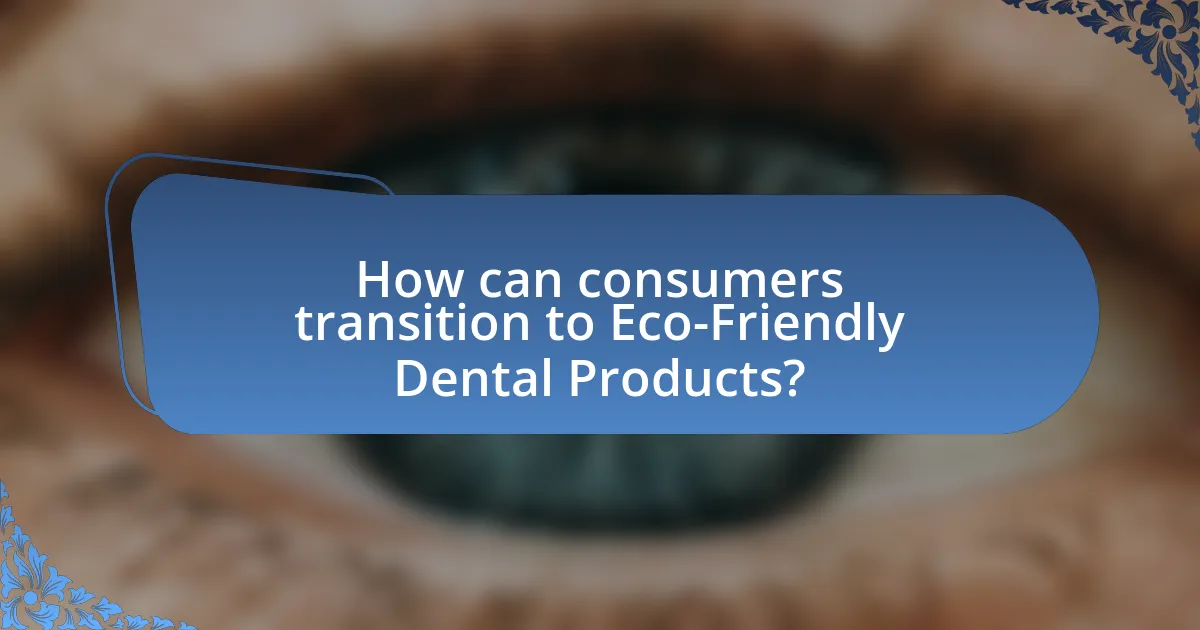
How can consumers transition to Eco-Friendly Dental Products?
Consumers can transition to eco-friendly dental products by gradually replacing conventional items with sustainable alternatives. This can be achieved by selecting biodegradable toothbrushes made from bamboo instead of plastic, using natural toothpaste that avoids harmful chemicals, and opting for floss made from silk or other biodegradable materials. Research indicates that plastic toothbrushes contribute significantly to ocean pollution, with an estimated 1 billion plastic toothbrushes discarded annually in the U.S. alone. By making these informed choices, consumers can significantly reduce their environmental impact while maintaining oral health.
What steps should consumers take to make the switch?
Consumers should first research eco-friendly dental products to understand their benefits and options. This involves comparing ingredients, packaging, and certifications of products like bamboo toothbrushes, natural toothpaste, and biodegradable floss. Next, consumers should gradually replace their current dental products with eco-friendly alternatives, starting with the items that need replenishing. Additionally, consumers can seek out local stores or online retailers that specialize in sustainable products to ensure they are making informed purchases. Finally, consumers should educate themselves on proper disposal methods for traditional dental products to minimize environmental impact, as many conventional items are not biodegradable.
How can consumers gradually replace traditional products with Eco-Friendly options?
Consumers can gradually replace traditional products with eco-friendly options by making incremental changes in their purchasing habits. For instance, when consumers run out of a traditional dental product, such as a plastic toothbrush, they can opt for a bamboo toothbrush instead. Research indicates that bamboo toothbrushes are biodegradable and reduce plastic waste, aligning with eco-friendly practices. Additionally, consumers can choose toothpaste tablets or refillable containers over conventional toothpaste tubes, which often contribute to landfill waste. By consciously selecting eco-friendly alternatives as they replace used products, consumers can effectively transition towards a more sustainable lifestyle without overwhelming changes.
What are some common misconceptions about Eco-Friendly Dental Products?
Common misconceptions about eco-friendly dental products include the belief that they are less effective than conventional products, that they are significantly more expensive, and that they lack variety. Research indicates that many eco-friendly dental products, such as bamboo toothbrushes and natural toothpaste, perform comparably to traditional options in terms of cleaning efficacy and oral health benefits. Additionally, while some eco-friendly products may have a higher upfront cost, many are competitively priced, especially when considering long-term sustainability and health benefits. Furthermore, the market for eco-friendly dental products has expanded, offering a wide range of choices that cater to different consumer preferences, debunking the myth of limited options.
What are the best practices for using Eco-Friendly Dental Products?
The best practices for using eco-friendly dental products include selecting biodegradable toothbrushes, using natural toothpaste without harmful chemicals, and ensuring proper disposal of products. Biodegradable toothbrushes, often made from bamboo, decompose naturally, reducing plastic waste. Natural toothpaste typically avoids synthetic ingredients, promoting both oral health and environmental sustainability. Proper disposal practices, such as recycling packaging and composting biodegradable items, further minimize environmental impact. These practices align with the increasing consumer demand for sustainable options in dental care, reflecting a broader trend towards eco-conscious living.
How can consumers maximize the benefits of Eco-Friendly Dental Products?
Consumers can maximize the benefits of eco-friendly dental products by selecting items that are certified organic or have credible eco-labels, ensuring they are made from sustainable materials. Research indicates that products with certifications, such as the USDA Organic seal, are more likely to meet environmental standards and reduce harmful chemical exposure. Additionally, consumers should prioritize products that utilize biodegradable packaging, as this significantly decreases plastic waste. A study published in the Journal of Cleaner Production highlights that switching to biodegradable dental products can reduce landfill contributions by up to 30%. By actively choosing these certified and sustainable options, consumers can enhance their oral health while contributing positively to environmental sustainability.
